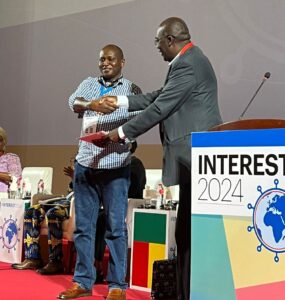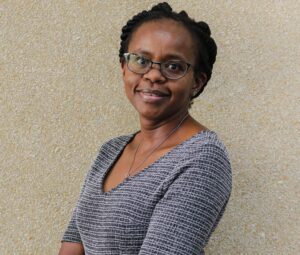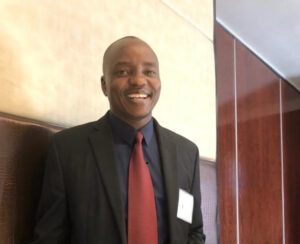In science, like in many fields, gender disparity persists but my journey as an African female scientist stands as a powerful testament to the transformative potential of resilience, determination, and robust support systems. Overcoming societal expectations and breaking through gender, racial, and systemic barriers, my journey in Science, Technology, Engineering, and Mathematics (STEM) has been marked by perseverance and the realization that science knows no boundaries.
As a young African female, traditional gender roles were deeply ingrained from childhood and my passion for pursuing a career in science was met with skepticism, unconscious biases, resistance, and challenges. Yet, I pressed on, fuelled by a desire to challenge stereotypes and redefine possibilities. Unfortunately, these challenges are not unique to me but common for females in STEM fields.
Discrimination, limited opportunities, and societal expectations often stand as formidable obstacles, threatening to derail women and girls from realizing their dreams. Moreover, pervasive stereotypes about fields like medical entomology, nanotechnology, and biomedical innovation being predominantly more suited to men initially demotivated me to pursue a career in these fields. Furthermore, the absence of women in leadership positions within these disciplines added to my initial discouragement.
Additionally, I found that maintaining a work-life balance was quite challenging for me due to the societal pressure and expectations of women’s gender roles. It can be daunting to balance the demands of a career in research or academia with family responsibilities. Women are often under pressure to choose between advancing their careers and prioritizing their personal lives. It took me some time to figure out how to partition and negotiate protected time to pursue my goals while also fulfilling my family’s duties and expectations.
However, I was not deterred by societal barriers and I pursued my passion for science, specifically the field of Public Health, with a desire to redefine possibilities and challenge stereotypes. I sought out opportunities and avenues that would eventually lead me to the support I needed. A pivotal turning point in my academic journey was when I received the CARTA PhD fellowship in 2020 to pursue a PhD in Environmental Health at the University of Ibadan, Nigeria. CARTA seeks to build a critical mass of African scientists and researchers to empower African institutions. Among the many strengths of the program is the commitment to fostering diversity and empowering an equitable environment for African Early Career Researchers (ECRs). The program is guided by a strong gender policy and this has been a catalyst for many fellows, especially women researchers, providing crucial support, mentorship, and networking opportunities.
CARTA’s selection process actively champions diversity and inclusion in the scientific community. Through their initiatives, they not only support individual scientists but also encourage women to thrive in their chosen careers while advocating for systemic changes. This inclusive approach has fostered an environment where stereotypes are dismantled, and talents can flourish regardless of gender, paving the way for future generations of women scientists like me.
The CARTA PhD fellowship award goes beyond financial support; it has helped me significantly in my research by providing holistic support, mentorship, and networking opportunities in my field and beyond. Through these connections, I was able to overcome obstacles, gain access to resources, attend international conferences, and collaborate with leading scientists from around the world. This collaboration resulted in several research outputs, including patents and publications in my research area. I appreciate initiatives like CARTA, which challenge the status quo and promote inclusivity in the scientific community, as they have helped me in achieving my professional goals.
I have been fortunate to have a supportive network of mentors, colleagues, and peers who have provided me with guidance and encouragement. This has been a great motivation for me to succeed. Additionally, developing a strong sense of self-confidence and assertiveness has helped me navigate the challenges often faced by women in scientific fields, such as the glass ceiling and stereotypes. Today, on International Women and Girls in Science Day, I am reflecting on my journey from being an inquisitive and ambitious junior school girl who loved mathematics, biology, and science, to becoming an early-career female researcher and scientist, defying all odds against me. I realize that there are others like me out there still aspiring to become with the potential to excel if given the right opportunity and space to thrive.
Despite the challenges that women and girls face in the STEM field, it is important to recognize that they possess the resilience, determination, and talent to overcome these obstacles. Mentorship programs that are tailored to support women and girls in the sciences can help them navigate these challenges. Moreover, collective actions that encourage women and girls to pursue their passions and ambitions, support one another, advocate for change, and seek out opportunities for leadership and visibility can enable them to thrive and make significant contributions to the world through STEM.
As I continue to make strides in my field, break barriers, and contribute to the scientific landscape, I take responsibility to inspire and uplift others, especially girls in STEM. Through mentorship, role modeling, and targeted projects, I aim to guide, sustain, and maximize the potential of African girls to excel in STEM career paths. I firmly believe that promoting gender diversity in science is not only advantageous but also crucial, serving as an investment in our shared future for the progress of knowledge and the enhancement of society. On a larger scale, I envision not a future but a present where we act to create a holistic and enabling environment for girls and women of all ages and family responsibilities to thrive in science by putting in place actionable policies.
About the Author
Ohia Chinenyenwa is a CARTA Cohort 10 Fellow with affiliations to the University of Ibadan, Nigeria and Indian Institute of Technology, Bombay, India.
Links to Scientific Profiles
- CARTA bio: https://cartafrica.org/fellows-and-graduate/chinenyenwa-ohia/
- CARTA-Evidence profile: https://carta-evidence.org/author/1000889294/
- Google Scholar: https://scholar.google.com/citations?user=mQ2RFI8AAAAJ&hl=en
- Research Gate: https://www.researchgate.net/profile/Chinenyenwa_Ohia
- ORCID No.: http://orcid.org/0000-0001-8337-3221
- LinkedIn: https://www.linkedin.com/in/chinenyenwa-kanu-ohia-555b5640/
- edu: https://ibadan.academia.edu/doraohia





No Comments